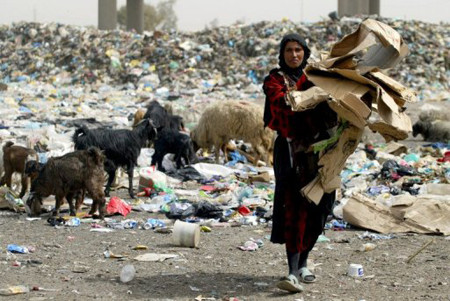BERLIN — Iraq and Afghanistan on Tuesday came near the top of a closely watched global list of countries perceived to be the most corrupt, despite efforts to stamp out graft in the war-torn nations.

Poor people are suffering the consequences of corruption, Transparency International says (Photo: AFP)
Nearly three-quarters of the 178 countries in Transparency International's annual survey scored on the sleazier end of the scale, which ranges from zero (perceived to be highly corrupt) to 10 (thought to have little corruption).
"The results indicate a serious corruption problem," the Berlin-based non-governmental organisation said.
"Allowing corruption to continue is unacceptable; too many poor and vulnerable people continue to suffer its consequences around the world," said TI's president Huguette Labelle in a statement.
"There should be nowhere to hide for the corrupt or their money," she added.
The head of the group's German section, Edda Mueller, said the overall international situation was "very worrying".
She added that percentage of countries below average was "a very bad signal for attempts to solve global problems."
Iraq was fourth from top of the most corrupt ranking, Myanmar shared second place with Afghanistan and lawless Somalia was considered the world's most corrupt country, with a score of 1.1.
"There are clear indications that the more unstable a country is, the higher the level of corruption," Mueller told AFP.
She stressed the need for the international community to put credible governing structures in place in so-called "failed states."
"That is at least as important as billions in development aid," she said.
At the other end of the scale, Denmark, New Zealand and Singapore were seen as the nations least blighted by corruption, scoring 9.3 points.
They were followed by Finland, Sweden, Canada and the Netherlands.
Certain countries were singled out for an improvement in their fight against graft, notably Chile, Ecuador, Macedonia, Kuwait and Qatar.
Mueller said that the performance of these countries should serve as hope and inspiration for countries like Afghanistan and Iraq.
"There is still hope. We put in some countries that have improved their score precisely to show that there is the chance to improve and that it is possible."
Criticised for going the other way, however, were the United States, the Czech Republic, Greece, Hungary, Italy, Madagascar and Niger.
The United States was 22nd on the list, while Greece and Italy came in at 78th and 67th respectively. China was level with Greece.
TI said corruption was hampering efforts to combat "the world's most pressing problems" such as the financial crisis and climate change.
The watchdog also noted that of the 36 countries that have signed the OECD's anti-bribery convention forbidding greasing the palms of foreign officials, "as many as 20 show little or no enforcement of the rules."
This sends "the wrong signal about their commitment to curb corrupt practices," TI said.



